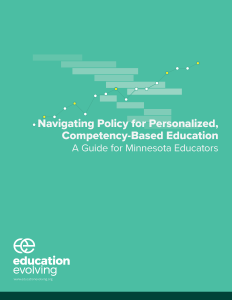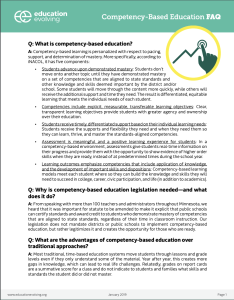Covid-19 exacerbated inequities long present in public education and many students will leave this period with months of “lost learning.” Short of repeating entire courses, addressing these gaps presents a grave challenge for traditionally structured schools.
Competency-based education (CBE) is an alternate approach, which better identifies and targets individual learning needs. In CBE, learning is oriented around students mastering clearly articulated learning outcomes rather than passing time in seats.
For the last two years, we’ve advocated for a bill to explicitly authorize CBE in Minnesota (more on this below). Now we’re taking another approach: asserting Minnesota laws are highly permissive of doing CBE right now.
Our new guide, out Spring 2021, shows educators how to navigate laws, regulations, and reporting requirements as they implement CBE approaches, both this year in responding to Covid and beyond.
Context on Prior Legislative Initiatives
From 2018 to 2020 we advocated for bills at the Minnesota Legislature that would explicitly authorize competency-based education. Importantly, these bills did not mandate schools to implement competency-based education, but rather creates the opportunity for those who are ready. For more information, see:
- The full text of the bills (HF2190/SF485)
- A concise summary of the bills
- An FAQ on competency-based education
- Coverage of the 2020 Minnesota Senate hearing on SF485—on our blog, KnowledgeWorks’ blog, and iNACOL’s blog. See also Audio of the Senate hearing
- Coverage of 2019 education omnibus bills—including the The full text of SF7, the 2019 Senate education omnibus bill, our blog post on the omnibus bills, and audio of the Senate hearing on SF7.





